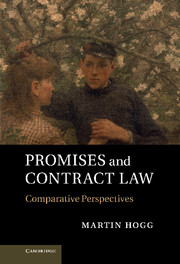Book contents
- Frontmatter
- Contents
- Preface
- Abbreviations of Court Names
- Table of Cases
- Table of Legislation
- Part 1 Theoretical and historical introduction
- Part 2 The modern law
- 4 Formation of contract
- 5 Third party rights
- 6 Contractual remedies
- 7 The renunciation of contractual rights
- Part 3 The future
- Bibliography
- Index
6 - Contractual remedies
Published online by Cambridge University Press: 05 August 2011
- Frontmatter
- Contents
- Preface
- Abbreviations of Court Names
- Table of Cases
- Table of Legislation
- Part 1 Theoretical and historical introduction
- Part 2 The modern law
- 4 Formation of contract
- 5 Third party rights
- 6 Contractual remedies
- 7 The renunciation of contractual rights
- Part 3 The future
- Bibliography
- Index
Summary
The field of remedies provides fertile ground for analysing whether legal systems have a high regard for the promises made by parties to a contract, or indeed the promises made by a unilateral promisor (the same remedies generally being available for such promises), or whether instead what is sought is the achievement of goals other than promissory ones.
One would expect a high regard for promise in any legal system to be reflected both in a ready availability of remedies designed to secure actual enforcement of what has been promised (whether the performance promised was an act or forbearance from an act) as well as in substitutionary remedies which reflect, so far as is possible in substitutionary form, the so-called ‘performance interest’ of the parties (as defined below). If, however, enforcement of performance is an exceptional remedy, or if substitutionary remedies do not achieve the equivalent of enforcement but protect instead some other interest of the promisee, doubts must be raised as to whether a high regard for the value of promise is a hallmark of the system in question.
- Type
- Chapter
- Information
- Promises and Contract LawComparative Perspectives, pp. 334 - 427Publisher: Cambridge University PressPrint publication year: 2011



